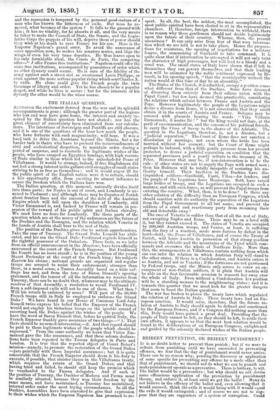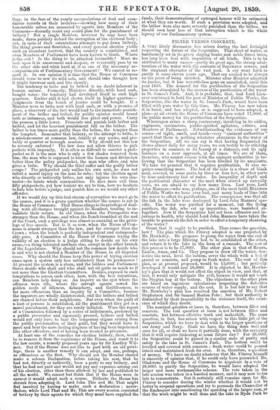BRIBERY PREVENTION, OR BRIBERY PUNISHMENT?
Jr is no doubt better to prevent than punish ; but if we were to refrain from punishing until we have succeeded in preventing offences, we fear that the day of punishment would never arrive. There can be no reason why, pending the discovery or application of some specific for preventing any offence by a mode other than that of punishment, we should not do what we can to punish and make punishment operate as a preventive. There is bribery, to wit. The ballot would be a preventive ; but why should we not devise some efficacious application of the prevention by punishment theory, and enforce it, at least until we get the ballot ? Many do not believe in the efficacy of the ballot and, even allowing that it would succeed, think the evils it would bring with it would equal the evils it would extinguish ; and of course we are not to sup- pose that they are supporters of a system of corruption. Could
they, in the face of the yearly accumulations of foul and scan- dalous records in their archives—showing how many of their honourable selves are concocted by agents into Members of the Commons—decently resist any sound plan for the punishment of bribery ? Not a single Member, however he may have been made, dares publicly defend the corruption of the electoral body ; yet, in spite of their ostentatious attempts to put down bribery, the thing grows and flourishes, and every general election yields such an abundant harvest, that the country is scandalized, and even Members of Parliament have been known to blush. Where is the evil ? Is the thing to be attacked invincible ? Must we look upon it in amazement and despair, or reverently pass by on the other side and wink hard at it as one of the necessary ac- companiments of Parliamentary Government ? We cannot so re- gard it. In our opinion it is time that the House of Commons. should cease to sow its wild oats, and should take thought how it might forswear sack and live cleanly. The tendency to bribe and be bribed is no doubt inherent in human nature. Formerly, Ministers directly, with hard cash, bought votes : the tendency had developed itself in such high quarters. Earlier still it had shown itself in higher quarters— judgments from the bench of justice could be bought. If a Minister were to bribe now with hard cash, or with a promise of place, a discovery of the fact would lead to the immediate punish- ment of the briber and bribed, for public opinion would brand both as infamous, and both would lose place and power. Carry the process a little lower. Prosecute and punish both briber and bribed, and let the heaviest punishment fall on the briber. The briber is ten times more guilty than the bribee, the tempter than the tempted. Remember that bribery, or the attempt to bribe, is a misdemeanour at common law, triable at any assize, and pro- bably at quarter or borough sessions. Why should not this law be severely enforced ? The law does not allow thieves to pick pockets with impunity. It is often as difficult to convict a pick- ket an it is the man who is only a few shades removed from , the man who is supposed to know the human and divine law better than the paltry pickpocket, the man who offers and who gives a bribe. Why should the thief suffer and the guilty briber escape ? The pickpocket only sullies his own soul, he does not inflict a moral injury on the man he robs ; but the election agent who directly or indirectly bribes, not only injures his own cha- racter—he taints whole communities. He does more evil than fifty pickpockets, yet how lenient we are to him, how we hesitate to hale him before ajudge, and punish him as we would any other offender.
If we would dry up this foul stream of corruption we must go to the source, and it is a grave question whether the source is not in the House of Commons. That House clings to its privilege of deal- ing with all charges brought against its Members tending to in- validate their return. In old times when the Prerogative was stronger than the House and when the Bench trembled at the nod of the Court, such a privikge was almost as essential as the privi- lege of free speech. But is it so now, when the House of Com- mons is almost stronger than the law, and far stronger than the Crown ; when the bench is perfectly independent and unimpeach- ably. pure. A Committee of the House of Commons trying the validity of an election is a judge sitting to decide on his own cause,—a thing tolerated nowhere else, except in the other branch of the Legislature, Why should not the common law decide who is and who is not elected a Member of the House in all disputed cases. Why should the House keep this power of trying election cases upon a system only less satisfactory than its predecessor ? At present the system is a sham, and the lobbies and Parliament Street decide who shall and who shall not sit quite as much as if not more than the Election Committees. Besides, exposed to such temptations to screen each other, how, with the best intentions, can Members help doing so. An inquiry on the spot where the offences were rife where the corrupt agents sowed the golden seeds of idleness, debauchery, and thriftlessness, is far more efficacious than an inquiry by a Committee, because the inquirers are wholly disinterested, and the bribers and bribed are shamed before their neighbours. But even when the guilt of a host of persons is established, all the punishment they get is a moral punishment, for they are rarely indicted. -Were the report of a Commission followed by a series of indictments, preferred by a public prosecutor and rigorously pressed, bribers and bribed would not only have to bear the temporary stigma arising from the public proclamation of their guilt, but they would have to meet and bear the more lasting disgrace of having been imprisoned like other offenders, and of having been treated as prisoners.
At least one of the remedies for election bribery, then, would be to remove it from the cognizance of the House, and remit it to the law courts, a remedy proposed years ago by Sir Eardley Wil- mot. But if the House does not like towith an old privi- lege, there is another remedy it can aril, and one perhaps, as efficacious as the first. Why should not the Member elected make a solemn Declaration, before taking his seat, that he had not, directly or indirectly, been a party to any bribery, and that he had not paid and, would not pay any expenses arising out of his election, other than those allowed by law and published to all the world. We cannot but think that if the House were in earnest it would adopt such a course. Hitherto the House has shrank from adopting it. Lord John This and Mr. That might feel insulted by having to make such a declaration ; never- theless, while Lord That and Mr. This are every session convicted of bribery by their agents for which they must have supplied the funds, their demonstrations of outraged honour will be estimated at what they are worth. If such a provision were adopted, and the briber were also more severely punished than the bribee, we should soon hear less of that corruption which is the white leprosy of our Parliamentary system.



























 Previous page
Previous page